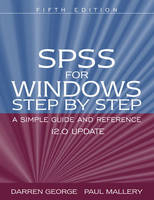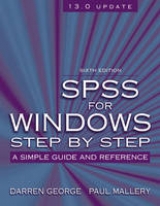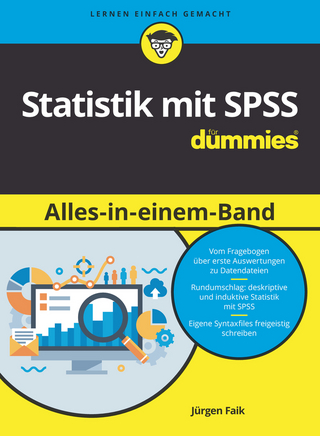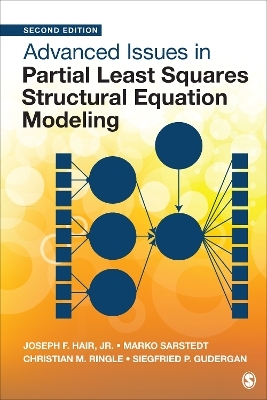
SPSS for Windows Step-by-Step
Routledge (Verlag)
978-0-205-45245-3 (ISBN)
- Titel erscheint in neuer Auflage
- Artikel merken
SPSS for Windows Step by Step: A Simple Guide and Reference 12.0 Update efficiently shows you how to perform the most common data analysis procedures in SPSS. It is brief but comprehensive. The first part of the book explains the basics of creating and formatting a data set, and a chapter on graphs to accommodate the changes in SPSS 12.0. Chapters 6-28 explain, step-by-step, the most common procedures in the Base System Module and the Advanced and Regression Modules; each chapter is arranged in three parts:
“Introduction” explains the following procedure at the general, conceptual level, avoiding excessive detail and excessive emphasis on computation.
“Step by Step” boxes and screen shots break down each procedure with clear references to tasks covered in previous chapters.
“Outcome” explains the output of what you have just performed and defines critical terms.
All data sets used in this book are available for download on the companion website: http://www.ablongman.com/george5e, saving you the time of entering data.
1. An Overview of SPSS for Windows Step by Step.
2. SPSS Windows Processes: Mouse and keyboard processing, frequently-used dialog boxes, editing output, printing results, the Options Option.
3. Creating and Editing a Data File.
4. Managing Data: Listing cases, replacing missing values, computing new variables, recoding variables, exploring data, selecting cases, sorting cases, merging files.
5. Graphs: Creating and editing graphs and charts.
Base System Module.
6. Frequencies: Frequencies, bar charts, histograms, percentiles.
7. Descriptive Statistics: Measures of central tendency, variability, deviation from normality, size, and stability.
8. Crosstabulation and Chi-Square (*2) Analyses.
9. The Means Procedure.
10. Bivariate Correlation: Bivariate correlations, partial correlations, and the correlation matrix.
11. The T Test Procedure: Independent-samples, paired-samples, and one-sample tests.
12. The One-Way ANOVA Procedure: One-way Analysis of Variance.
13. General Linear Models: Two-Way Analysis of Variance.
14. General Linear Models: Three-Way Analysis of Variance and the influence of covariates.
15. Simple Linear Regression.
16. Multiple Regression Analysis.
17. Nonparametric Procedures.
18. Reliability Analysis: Coefficient alpha (*) and split-half reliability.
19. Multidimensional Scaling.
20. Factor Analysis.
21. Cluster Analysis.
22. Discriminant Analysis.
Advanced and Regression Modules.
23. General Linear Models: MANOVA and MANCOVA Multivariate Analysis of Variance and Covariance.
24. General Linear Models: Repeated-Measures MANOVA: Multivariate Analysis of Variance with repeated measures and within-subjects factors.
25. Logistic Regression.
26. Hierarchical Loglinear Models.
27. General Loglinear Models.
28. Residuals: Analyzing left-over variance.
Data Disk.
Glossary.
References.
Index.
| Erscheint lt. Verlag | 16.11.2004 |
|---|---|
| Verlagsort | New York |
| Sprache | englisch |
| Maße | 275 x 215 mm |
| Gewicht | 930 g |
| Themenwelt | Mathematik / Informatik ► Mathematik ► Computerprogramme / Computeralgebra |
| ISBN-10 | 0-205-45245-0 / 0205452450 |
| ISBN-13 | 978-0-205-45245-3 / 9780205452453 |
| Zustand | Neuware |
| Haben Sie eine Frage zum Produkt? |
aus dem Bereich



